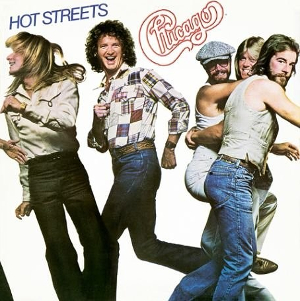Hot Streets
| Hot Streets | ||||
|---|---|---|---|---|

(From left to right)
Donnie Dacus, Lee Loughnane, Danny Seraphine, Peter Cetera, James Pankow |
||||
| Studio album by Chicago | ||||
| Released | October 2, 1978 | |||
| Recorded | May–June 1978 at Criteria Studios, Miami, The Record Plant, Los Angeles and A&R Recording, New York City | |||
| Genre | Rock, jazz rock, disco | |||
| Length | 41:53 | |||
| Label | Columbia | |||
| Producer | Phil Ramone and Chicago | |||
| Chicago chronology | ||||
|
||||
| Singles from Hot Streets | ||||
|
||||
| Professional ratings | |
|---|---|
| Review scores | |
| Source | Rating |
| AllMusic | |
Hot Streets is the tenth studio album (twelfth overall) by the American band Chicago, released in 1978. In many ways, Hot Streets marked the beginning of a new era for the band, turning to disco music, a move which would be derided in retrospect. It was also the band's first album with all-new material released since their second that didn't have a numbered title. It was also the first album not to feature original guitarist/vocalist Terry Kath, who died from an accidental self-inflicted gunshot wound in January 1978. He was replaced by Donnie Dacus on this album.
Having worked with James William Guercio since their 1969 debut, Chicago decided to part ways with the producer following the release of Chicago XI in 1977. A bigger change for the group, however was the death of guitarist Terry Kath in January 1978, who unintentionally shot himself at a roadie's house while cleaning one of his guns. The members of the band were devastated by his death, and considered breaking up. Kath was one of the key players who most defined the rhythmic sound of the band. After the initial shock waned, the group decided that they still had something to offer musically, and carried on.
Phil Ramone, who had mixed some of their earlier albums, was called upon to co-produce their new effort. But before Chicago could begin recording, they had to contend with the difficult process of finding a new guitarist. Accomplished guitarist Donnie Dacus was chosen, bringing his own distinctive style to the group's music. Prior to joining Chicago, Dacus had worked with both Roger McGuinn and Stephen Stills.
Recording sessions took place both in Miami and Los Angeles that spring, after years of working at Guercio's Caribou Ranch in Colorado. By the end of the sessions, the band felt as though they were still in a strong musical position even after the loss of Kath. Recording the album Spirits Having Flown next door at the same Miami studio, some of the tracks featured the Bee Gees and their keyboardist, Blue Weaver. The Gibb brothers added vocals to the song "Little Miss Lovin'" while Weaver added synthesized strings to "No Tell Lover" and "Show Me The Way". In turn, Chicago's horn section played on Spirits Having Flown, most notably on the hit single "Too Much Heaven".
...
Wikipedia
